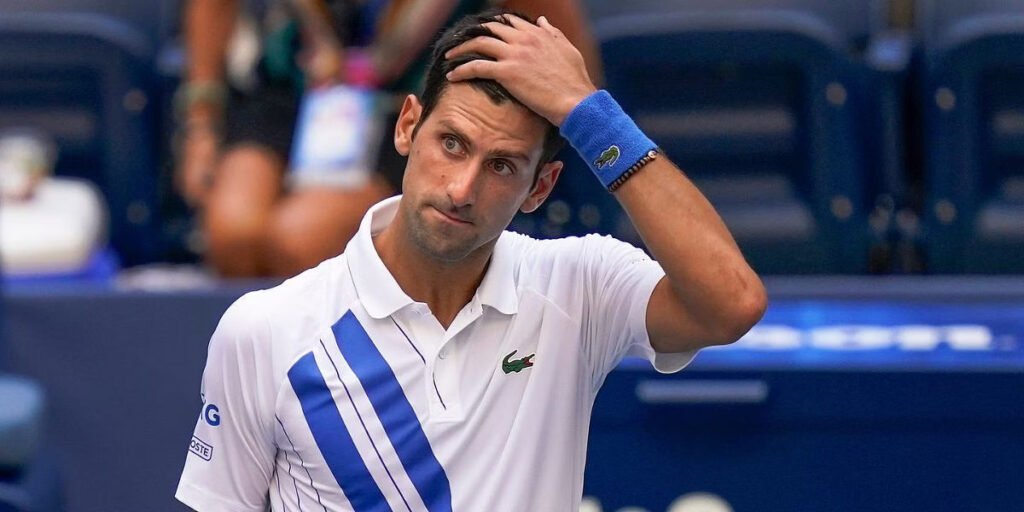The International Tennis Integrity Agency (ITIA) has clarified that Novak Djokovic did not decline to undergo a doping test before a Davis Cup match.

The International Tennis Integrity Agency (ITIA) has clarified that Novak Djokovic did not decline to undergo a doping test before a Davis Cup match. The ITIA sought to dispel any misinformation or misconceptions surrounding the situation. The controversy surrounding Novak Djokovic’s recent doping test situation has escalated, reaching a pivotal moment with the International Tennis Integrity Agency (ITIA) stepping forward to support the Serbian player.
Djokovic voiced his frustration after being unexpectedly asked to undergo a doping test just 90 minutes before his singles match in the Davis Cup quarterfinal against Great Britain. The 24-time Major winner reportedly did not immediately take the test, prompting the anti-doping controller to shadow him for hours before eventually conducting blood and urine tests. Djokovic explained his stance, saying, “It’s the first time it’s happened to me. It doesn’t make sense to do it when I’ll be there after the match.”
He further elaborated on the situation, expressing his concern about the disruption to his pre-match routine and the lack of necessity for such testing before a match. Djokovic’s resistance sparked initial reports claiming that he had refused to comply with anti-doping rules.
However, the ITIA has clarified the situation, asserting that Djokovic did not refuse the test. The agency emphasized that players in the Davis Cup, specifically, had the option to submit their blood samples either before or after their matches. Contrary to some reports, the testing protocol had not changed for this event or for Djokovic. The ITIA clarified, “The rules state that when a player is notified, they must provide a sample as soon as they can.”
In team competitions like the Davis Cup, players may receive notifications before a match, providing them with the flexibility to choose whether to undergo testing before or after their matches. This revelation sheds light on the fact that Djokovic’s actions were within the scope of the established protocols for such events. The ITIA’s statement brings clarity to the situation, indicating that the testing procedure remained consistent and players were given the autonomy to decide the timing of their tests in team competitions like the Davis Cup.
Marion Bartoli, former Wimbledon champion, has strongly criticized the surprise doping test imposed on Novak Djokovic, describing it as “disgusting, shameful, and completely unjustified.” The outspoken commentary from Bartoli reflects a sentiment of disapproval and raises questions about the circumstances surrounding Djokovic’s unexpected anti-doping test.

Marion Bartoli, the 2013 Wimbledon champion, has voiced her discontent with the International Tennis Integrity Agency’s (ITIA) approach to doping tests, particularly emphasizing her belief that samples should be collected post-match. Bartoli expressed her perspective on the matter, highlighting the rigorous monitoring athletes undergo when notified of impending doping tests.
“When you know you’re going to have a doping test, you have someone following you all day. As soon as you leave the court, he follows you, he is in the locker room when you take your shower. And if you can’t go to the bathroom, he accompanies you to a press conference until you can urinate,” Bartoli remarked in a statement to welovetennis.fr.
She went on to emphasize the negligible difference between conducting tests before or after a match, arguing that post-match samples tend to exhibit higher urinary concentration due to dehydration during gameplay. Bartoli attributed the controversy surrounding Novak Djokovic’s recent doping test to what she characterized as uninformed accusations from certain sections of the British press.
“The ‘trial’ that we tried to do against Djokovic is linked to this British press which knows nothing, and which allows itself to accuse the players. It’s disgusting, it’s shameful and completely unjustified,” Bartoli concluded, expressing her dissatisfaction with the manner in which certain media outlets had handled the situation.

